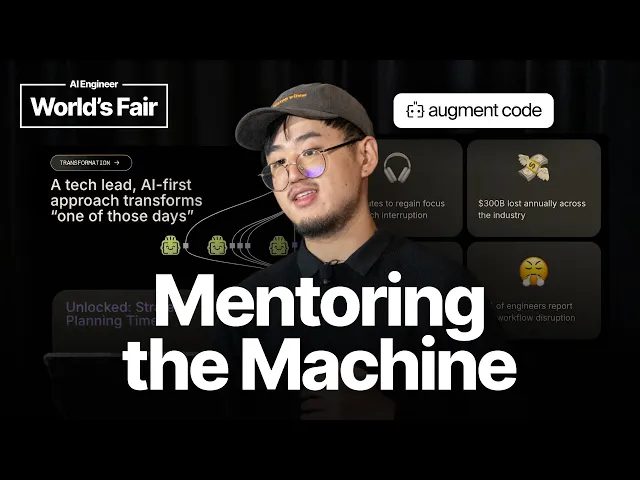Mentoring the Machine — Eric Hou, Augment Code

AI mentoring enables breakthrough code experiences
In an era where AI is rapidly transforming software development, Eric Hou's talk on "Mentoring the Machine" provides a fascinating glimpse into how we might reshape the relationship between developers and their AI assistants. Rather than viewing AI as a replacement for human coding skills, Hou articulates a vision where humans serve as mentors to these systems, guiding them toward more accurate, creative, and contextually appropriate solutions. This approach fundamentally shifts the paradigm from AI as tool to AI as collaborative partner requiring human guidance.
Key insights from Hou's presentation:
-
AI requires human mentorship – Despite impressive capabilities, AI coding assistants still need humans to provide context, catch errors, and guide them toward optimal solutions that align with the broader goals of a project.
-
Prompt engineering is evolving – Moving beyond basic prompts, developers are now using multi-step processes and providing extensive context to help AI models produce better code, essentially teaching machines to think more like experienced programmers.
-
Feedback loops are crucial – The most effective AI interactions happen when developers continuously refine their requests based on the AI's output, creating a conversational back-and-forth that mimics human collaboration.
-
Context is everything – AI systems perform dramatically better when given comprehensive project information, including business requirements, existing architecture, and design patterns rather than isolated coding tasks.
The most transformative aspect of Hou's talk is his vision of AI as a "junior developer" that needs mentorship rather than merely a tool to be used. This framework represents a profound shift in how we conceptualize human-AI collaboration in software development. Rather than seeing AI as either a threat that will replace programmers or a perfect solution that needs no guidance, Hou presents a more nuanced middle ground where human expertise remains essential but is amplified through AI partnership.
This mentorship model matters because it addresses one of the core anxieties of the AI age: the fear that machines will simply replace human workers. Instead, it suggests that human expertise will remain valuable but will evolve toward higher-level guidance, context-setting, and quality control. For businesses, this means investment in both AI tools and continued developer education will be necessary, with particular emphasis on teaching engineers how to effectively collaborate with AI systems.
What Hou
Recent Videos
How To Earn MONEY With Images (No Bullsh*t)
Smart earnings from your image collection In today's digital economy, passive income streams have become increasingly accessible to creators with various skill sets. A recent YouTube video cuts through the hype to explore legitimate ways photographers, designers, and even casual smartphone users can monetize their image collections. The strategies outlined don't rely on unrealistic promises or complicated schemes—instead, they focus on established marketplaces with proven revenue potential for image creators. Key Points Stock photography platforms like Shutterstock, Adobe Stock, and Getty Images remain viable income sources when you understand their specific requirements and optimize your submissions accordingly. Specialized marketplaces focusing...
Oct 3, 2025New SHAPE SHIFTING AI Robot Is Freaking People Out
Liquid robots will change everything In the quiet labs of Carnegie Mellon University, scientists have created something that feels plucked from science fiction—a magnetic slime robot that can transform between liquid and solid states, slipping through tight spaces before reassembling on the other side. This technology, showcased in a recent YouTube video, represents a significant leap beyond traditional robotics into a realm where machines mimic not just animal movements, but their fundamental physical properties. While the internet might be buzzing with dystopian concerns about "shape-shifting terminators," the reality offers far more promising applications that could revolutionize medicine, rescue operations, and...
Oct 3, 2025How To Do Homeless AI Tiktok Trend (Tiktok Homeless AI Tutorial)
AI homeless trend raises ethical concerns In an era where social media trends evolve faster than we can comprehend them, TikTok's "homeless AI" trend has sparked both creative engagement and serious ethical questions. The trend, which involves using AI to transform ordinary photos into images depicting homelessness, has rapidly gained traction across the platform, with creators eagerly jumping on board to showcase their digital transformations. While the technical process is relatively straightforward, the implications of digitally "becoming homeless" for entertainment deserve careful consideration. The video tutorial provides a step-by-step guide on creating these AI-generated images, explaining how users can transform...
